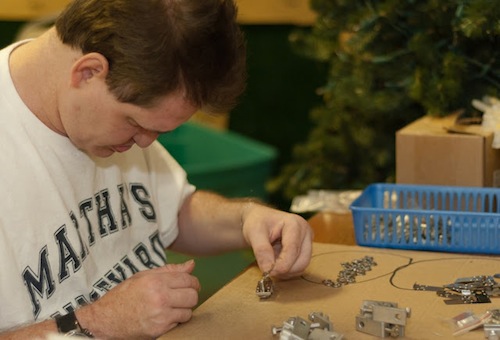


When experts opine that the days of large-scale assembly facilities are forever gone, are they overlooking how contract services can fulfill those same jobs and keep Americans with disabilities working? (Photo courtesy of Paige Connors, American Training, Inc.)
How to bring outsourced jobs back to Americans continues to be a story worthy of media coverage. There had been an uptick in manufacturing jobs returning to American shores even before President Obama made the issue a central part of his most recent State of the Union address. These are the kinds of jobs economists say have a “multiplier effect” for other types of jobs that support manufacturing, especially the types that can be performed by people with disabilities, including assembly, packing, sorting, and fulfillment.
But the federal government cannot act alone if the United States is to be successful in increasing employment opportunities for its citizens, as Donald F. Kettl points out in a column found in the April issue of Governing magazine. The dean of the University of Maryland School for Public Policy and nonresident senior fellow at the Brookings Institution provides a short history lesson to demonstrate why “much of Obama’s federal job-creation effort is really a state-based strategy,” when he writes:
Since the 1960s, job training and development has been a federal-state partnership, with states in the operational lead. The big expansion of federal job training programs in the 1970s came via block grants with federal cash and local responsibility.
Kettl continues this line of thought to a logical conclusion that funding increases for community colleges and other higher education opportunities will lead to a more skilled workforce. So while the new manufacturing model will offer higher-paying jobs to American workers, the basic duties of assembly and fulfillment will have to remain in other countries.
But Kettl is not factoring employment of people with disabilities into his projections. When he writes that the days of the “large scale assembly jobs” are forever in the past, he is overlooking how companies can streamline operations by utilizing contract labor services to perform those same duties traditionally done overseas. Nor is he considering a businesses’ ability to maintain control over their supply chain by keeping the assembly and shipping of products closer to the consumer base that purchases them.
One thing Kettl is most definitely correct about is that buy-in of organizations at the state and local levels is essential for the success of any effort to restore American jobs. Patty Wight’s report, “Maine Employers Urged to Hire Disabled,” for the Maine Public Broadcasting Network shows our neighbors to the north working toward that very goal. A chamber of commerce is doing right by their community when bringing together business owners to share the value of hiring people with disabilities as restaurant owner Cheryl Rust does:
Rust hired her first employee with a developmental disability 12 years ago, and she’s since hired a few more. She says she wasn’t sure how other employees would respond at first. But Rust says the disabled employees enhance the workplace, bringing stronger feelings of teamwork and community.
Comments?